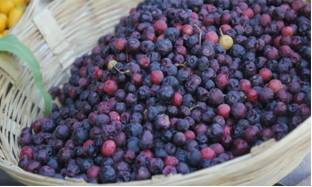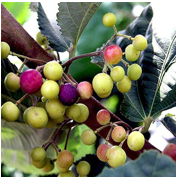i INP-WEALTHPK
Azeem Ahmed Khan
Though native to Pakistan and rich in nutritional value, falsa, a tiny round fruit known for its distinctive sweet and sour taste, remains underutilised, largely due to its extremely short shelf life.

Speaking to WealthPK, Saadat Ali Malik, a progressive farmer and an agricultural expert, said, “Falsa stays fresh for only a day or two after harvesting, making it difficult to transport to far-off markets.” This perishability, he noted, has limited its commercial reach, especially in terms of international exports.
However, Malik emphasised that falsa holds great potential for value addition, provided the right investments are made. “With proper processing, such as juicing, drying, or converting it into powder or concentrates for herbal supplements, Pakistan can export falsa-based products to countries where the fruit is not cultivated,” he said.
A graduate in agriculture from the University of Agriculture Faisalabad, Malik now works to support local farmers by supplying certified plants and offering consultancy and advisory services. He has urged authorities to formally commercialise falsa as an indigenous specialty fruit.
Falsa thrives in hot climates and can be cultivated at elevations of up to 1,000 meters above sea level, Malik said. “This plant cannot be grown in Europe or in cold climates, which creates a natural advantage for countries like Pakistan,” he added.

Though falsa is also grown in India, Bangladesh, Nepal, the Philippines, and Australia, most of the produce is consumed locally, and no substantial international fresh fruit trade exists due to its perishability.
Owing to its adaptability to different soils and low water requirements, falsa is especially suitable for arid and semi-arid regions. In Pakistan, falsa is extensively cultivated in areas such as Sargodha, Sheikhupura, Faisalabad, Multan, Bahawalpur, Lahore, Dera Ismail Khan, Sukkur, and Hyderabad.
In areas like Sharqpur Sharif, in the Sheikhupura district of Punjab, where hundreds of acres are dedicated to falsa alongside guava and lychee orchards, growers see untapped potential. “With the right policies and infrastructure for processing and value addition, falsa can become a key agro-based export for Pakistan,” he said.
Malik also emphasised falsa’s medicinal importance, calling it more of a natural remedy than a regular fruit. “It contains carbohydrates, fiber, protein, vitamins A, B, and C, calcium, potassium, phosphorus, sodium, iron, and magnesium.”
“Falsa is also used to treat heatstroke, heart ailments, high cholesterol, and digestive issues, and is beneficial for skin conditions like eczema,” he explained. Besides, it helps purify blood, relieve joint pain and fever, and may even prevent the growth of cancerous cells, he added.
Malik described falsa as an environmentally friendly and farmer-friendly crop because it grows well in light and sandy soils, requires minimal water, and thrives without the need for tillage or tractors. “Tractors are not needed, which saves fuel and reduces pollution,” he explained.
He said that up to 1,600 plants can be accommodated per acre, making it suitable for high-density farming.
“The falsa plant starts bearing fruit within a year of plantation, although full commercial production is achieved by the third year, reaching a peak yield of 200 maunds per acre,” Malik said.
Falsa plants are propagated through two methods, cuttings and seeds. However, Malik pointed out that propagation by cuttings has a low success rate, with only 20% to 30% of the plants surviving. “On the other hand, seed propagation offers about 95% germination success.”
“Farmers select the best mother plants based on fruit size, sweetness, and yield, and then collect and preserve seeds for future cultivation,” he informed WealthPK.
Pruning plays a vital role in falsa cultivation. “Severe pruning from the base is essential, because falsa flowers only grow on new branches. Pruning is conducted right after harvest in December or January, and new branches start bearing fruit in February, with flowering continuing from March to June.”
The falsa crop is largely pest-free, with only fruit flies appearing during the rainy season and occasional attacks by the woodcutter caterpillar, which bores into stems. “Keeping the orchard clean and weed-free is essential to prevent diseases and production losses,” Malik advised.
Farmers can manage weeds with hand hoe, spade, chemicals, or by adopting mulching, he said.
Credit: INP-WealthPk


